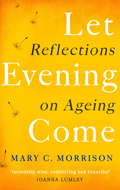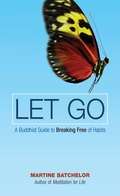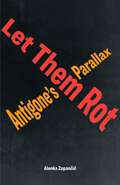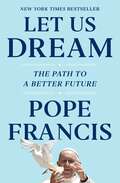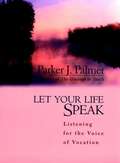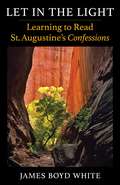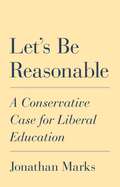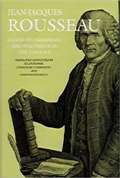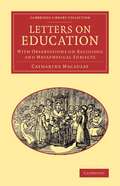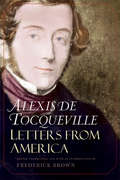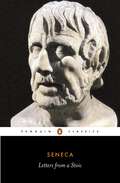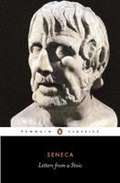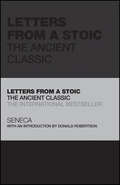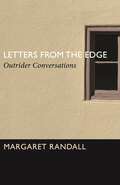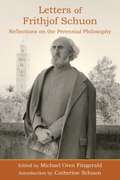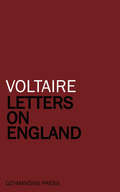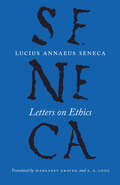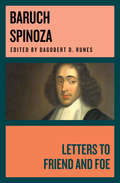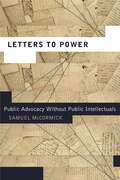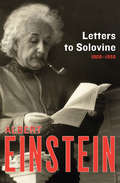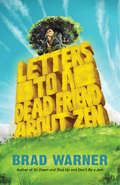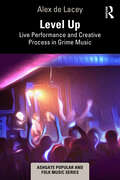- Table View
- List View
Let Evening Come: Reflections on Ageing
by Mary C. Morrison'Incredibly wise, comforting and beautiful' - Joanna LumleyIt is never too soon to start thinking about old age. In Let Evening Come, Mary C. Morrison, herself eighty-seven at the time of first publication, considers the gains and losses of the ageing process in all their depth and richness. She writes about old age from her own personal experience, describing without sentimentality or despair how it actually feels to grow old, to be old, to look back over life, to look forward to death. In a series of meditative passages and journal entries she presents old age as a time that calls for gallantry and courage, but one that also offers unique opportunities for inner growth and wisdom.Let Evening Come is a remarkable book; simply but elegantly written, it is both moving and uplifting. It is not only for those standing on the edge of old age, it is for people of all ages, and once read will be recommended to others for the very special pleasures found within its pages.
Let Go
by Martine BatchelorWhen we break free from the habits that limit us, a new world of possibilities opens up. In Let Go, Martine Batchelor leads the way there. Negative patterns of mind may manifest as fear, avoidance, depression, addiction, judgment of self or other, and any of a host of other physical, mental, or psychological forms. Let Go aims at understanding what really lies at the root of these behaviors so we can reclaim control. Each chapter concludes with an exercise or guided meditation as a tool for the reader to work with negative habits in new and creative ways. You don't have to be a Buddhist for them to work. You just need to want to move on. Helpful exercises and guided meditations - designed to build understanding of our negative habits, as well as the confidence and skill needed to instead embrace our greatest qualities - appear throughout the book. Batchelor also looks at Mindfulness-Based Cognitive Therapy (MBCT) for depression, Dr. Jeffrey Schwartz's use of meditation to deal with Obsessive-Compulsive Disorder (OCD), successful combinations of meditation and Twelve-Step programs, and offers her own innovations.
Let Them Rot: Antigone’s Parallax (Idiom: Inventing Writing Theory)
by Alenka ZupančičA provocative, highly accessible journey to the heart of Sophocles’ Antigone elucidating why it keeps resurfacing as a central text of Western thought and Western culture.There is probably no classical text that has inspired more interpretation, critical attention, and creative response than Sophocles’ Antigone. The general perspective from which the book is written could be summarized with this simple question: What is it about the figure of Antigone that keeps haunting us? Why do all these readings and rewritings keep emerging? To what kind of always contemporary contradiction does the need, the urge to reread and reimagine Antigone—in all kinds of contexts and languages—correspond? As key anchor points of this general interrogation, three particular “obsessions” have driven the author’s thinking and writing about Antigone. First is the issue of violence. The violence in Antigone is the opposite of “graphic” as we have come to know it in movies and in the media; rather, it is sharp and piercing, it goes straight to the bone. It is the violence of language, the violence of principles, the violence of desire, the violence of subjectivity. Then there is the issue of funerary rites and their role in appeasing the specific “undeadness” that seems to be the other side of human life, its irreducible undercurrent that death alone cannot end and put to rest. This issue prompted the author to look at the relationship between language, sexuality, death, and “second death.” The third issue, which constitutes the focal point of the book, is Antigone’s statement that if it were her children or husband lying unburied out there, she would let them rot and not take it upon herself to defy the decree of the state. The author asks, how does this exclusivist, singularizing claim (she would do it only for Polyneices), which she uses to describe the “unwritten law” she follows, tally with Antigone’s universal appeal and compelling power? Attempting to answer this leads to the question of what this particular (Oedipal) family’s misfortune, of which Antigone chooses to be the guardian, shares with the general condition of humanity. Which in turn forces us to confront the seemingly self-evident question: “What is incest?”Let Them Rot is Alenka Zupančič’s absorbing and succinct guided tour of the philosophical and psychoanalytic issues arising from the Theban trilogy. Her original and surprising intervention into the broad and prominent field of study related to Sophocles’ Antigone illuminates the classical text’s ongoing relevance and invites a wide readership to become captivated by its themes.
Let Us Dream: The Path to a Better Future
by Pope Francis Austen IvereighIn this uplifting and practical book, written in collaboration with his biographer, Austen Ivereigh, the preeminent spiritual leader explains why we must—and how we can—make the world safer, fairer, and healthier for all people now.In the COVID crisis, the beloved shepherd of over one billion Catholics saw the cruelty and inequity of our society exposed more vividly than ever before. He also saw, in the resilience, generosity, and creativity of so many people, the means to rescue our society, our economy, and our planet. In direct, powerful prose, Pope Francis urges us not to let the pain be in vain. He begins Let Us Dream by exploring what this crisis can teach us about how to handle upheaval of any kind in our own lives and the world at large. With unprecedented candor, he reveals how three crises in his own life changed him dramatically for the better. By its very nature, he shows, crisis presents us with a choice: we make a grievous error if we try to return to some pre-crisis state. But if we have the courage to change, we can emerge from the crisis better than before. Francis then offers a brilliant, scathing critique of the systems and ideologies that conspired to produce the current crisis, from a global economy obsessed with profit and heedless of the people and environment it harms, to politicians who foment their people&’s fear and use it to increase their own power at their people&’s expense. He reminds us that Christians&’ first duty is to serve others, especially the poor and the marginalized, just as Jesus did. Finally, the Pope offers an inspiring and actionable blueprint for building a better world for all humanity by putting the poor and the planet at the heart of new thinking. For this plan, he draws not only on sacred sources, but on the latest findings from renowned scientists, economists, activists, and other thinkers. Yet rather than simply offer prescriptions, he shows how ordinary people acting together despite their differences can discover unforeseen possibilities. Along the way, he offers dozens of wise and surprising observations on the value of unconventional thinking, on why we must dramatically increase women&’s leadership in the Church and throughout society, on what he learned while scouring the streets of Buenos Aires with garbage-pickers, and much more. Let Us Dream is an epiphany, a call to arms, and a pleasure to read. It is Pope Francis at his most personal, profound and passionate. With this book and with open hearts, we can change the world.
Let Your Life Speak: Listening For The Voice Of Vocation
by Parker J. PalmerWith wisdom, compassion, and gentle humor, Parker J. Palmer invites us to listen to the inner teacher and follow its leadings toward a sense of meaning and purpose. Telling stories from his own life and the lives of others who have made a difference, he shares insights gained from darkness and depression as well as fulfillment and joy, illuminating a pathway toward vocation for all who seek the true calling of their lives.
Let in the Light: Learning to Read St. Augustine's Confessions
by James Boyd WhiteSt. Augustine’s Confessions is heralded as a classic of Western culture. Yet when James Boyd White first tried to read it in translation, it seemed utterly dull. Its ideas struck him as platitudinous and its prose felt drab. It was only when he started to read the text in Latin that he began to see the originality and depth of Augustine’s work.In Let in the Light, White invites readers to join him in a close and engaged encounter with the Confessions in which they will come to share his experience of the book’s power and profundity by reading at least some of it in Augustine’s own language. He offers an accessible guide to reading the text in Latin, line by line—even for those who have never studied the language.Equally attuned to the resonances of individual words and the deeper currents of Augustine’s culture, Let in the Light considers how the form and nuances of the Latin text allow greater insight into the work and its author. White shows how to read Augustine’s prose with care and imagination, rewarding sustained attention and broader reflection.Let in the Light brings new life to a classic work, guiding readers to experience the immediacy, urgency, and vitality of Augustine’s Confessions.
Let's Be Reasonable: A Conservative Case for Liberal Education
by Jonathan MarksA conservative college professor's compelling defense of liberal educationNot so long ago, conservative intellectuals such as William F. Buckley Jr. believed universities were worth fighting for. Today, conservatives seem more inclined to burn them down. In Let's Be Reasonable, conservative political theorist and professor Jonathan Marks finds in liberal education an antidote to this despair, arguing that the true purpose of college is to encourage people to be reasonable—and revealing why the health of our democracy is at stake.Drawing on the ideas of John Locke and other thinkers, Marks presents the case for why, now more than ever, conservatives must not give up on higher education. He recognizes that professors and administrators frequently adopt the language and priorities of the left, but he explains why conservative nightmare visions of liberal persecution and indoctrination bear little resemblance to what actually goes on in college classrooms. Marks examines why advocates for liberal education struggle to offer a coherent defense of themselves against their conservative critics, and demonstrates why such a defense must rest on the cultivation of reason and of pride in being reasonable.More than just a campus battlefield guide, Let's Be Reasonable recovers what is truly liberal about liberal education—the ability to reason for oneself and with others—and shows why the liberally educated person considers reason to be more than just a tool for scoring political points.
Letter To D'Alembert And Writings For The Theater (The Collected Writings of Rousseau Volume #10)
by Jean-Jacques Rousseau Christopher Kelly Allan Bloom Charles ButterworthIn 1758, Jean Le Rond d'Alembert proposed the public establishment of a theater in Geneva--and Jean-Jacques Rousseau vigorously objected. Their exchange, collected in volume ten of this acclaimed series, offers a classic debate over the political importance of the arts. As these two leading figures of the Enlightenment argue about censorship, popular versus high culture, and the proper role of women in society, their dispute signals a declaration of war that divided the Enlightenment into contending factions. These two thinkers confront the contentious issues surrounding public support for the arts through d'Alembert's original proposal, Rousseau's attack, and the first English translation of d'Alembert's response as well as correspondence relating to the exchange. The volume also contains Rousseau's own writings for the theater, including plays and libretti for operas, most of which have never been translated into English. Among them, Le Devin du village was the most popular French opera of the eighteenth century while his late work Pygmalion is a profound meditation on the relation between an artist and his creation. This volume offers English readers a unique opportunity to appreciate Rousseau's writings for the theater as well as his attack on the theater as a public institution.
Letters On Education: With Observations On Religious And Metaphysical Subjects (Cambridge Library Collection)
by Catharine MacaulayFirst published in 1790, this collection of letters presents the mature views of Catharine Macaulay (1731-91) on education and related topics. Famed as an impassioned writer on history and politics, she defied eighteenth-century preconceptions of what it was possible and appropriate for women to achieve. Ranging across a broad spectrum of subjects, from diet and reading to pastimes, religion and discipline, this work reflects her enlightened thinking. She compares the educational situation in England to the contemporary French and American systems, and even those of ancient Rome and Sparta. Championing equality in education regardless of gender, Macaulay argues for the instruction of girls within a co-educational system, seeing this as the only way to improve female standing in society. Also reissued in this series is her eight-volume History of England (1763-83), which traces the upheavals of the seventeenth century.
Letters from America: Alexis de Tocqueville
by Alexis De Tocqueville Frederick BrownYoung Alexis de Tocqueville arrived in the United States for the first time in May 1831, commissioned by the French government to study the American prison system. For the next nine months he and his companion, Gustave de Beaumont, traveled and observed not only prisons but also the political, economic, and social systems of the early republic. Along the way, they frequently reported back to friends and family members in France. This book presents the first translation of the complete letters Tocqueville wrote during that seminal journey, accompanied by excerpts from Beaumont’s correspondence that provide details or different perspectives on the places, people, and American life and attitudes the travelers encountered. These delightful letters provide an intimate portrait of the complicated, talented Tocqueville, who opened himself without prejudice to the world of Jacksonian America. Moreover, they contain many of the impressions and ideas that served as preliminary sketches for Democracy in America, his classic account of the American democratic system that remains an important reference work to this day. Accessible, witty, and charming, the letters Tocqueville penned while in America are of major interest to general readers, scholars, and students alike.
Letters from a Stoic: Epistulae Morales Ad Lucilium
by Seneca'It is philosophy that has the duty of protecting us ... without it no one can lead a life free of fear or worry'For several years of his turbulent life, in which he was dogged by ill health, exile and danger, Seneca was the guiding hand of the Roman Empire. This selection of Seneca's letters shows him upholding the ideals of Stoicism - the wisdom of the self-possessed person immune to life's setbacks - while valuing friendship and courage, and criticizing the harsh treatment of slaves and the cruelties in the gladiatorial arena. The humanity and wit revealed in Seneca's interpretation of Stoicism is a moving and inspiring declaration of the dignity of the individual mind.Selected and translated with an Introduction by Robin Campbell
Letters from a Stoic: Epistulae Morales ad Lucilium
by Seneca Robin CampbellSelected from the Epistulae Morales ad Lucilium, Seneca's Letters from a Stoicare a set of 'essays in disguise' from one of the most insightful philosophers of the Silver Age of Roman literature. This Penguin Classics edition is translated from the Latin with an introduction by Robin Campbell. A philosophy that saw self-possession as the key to an existence lived 'in accordance with nature', Stoicism called for the restraint of animal instincts and the severing of emotional ties. These beliefs were formulated by the Athenian followers of Zeno in the fourth century BC, but it was in Seneca that the Stoics found their most eloquent advocate. Stoicism, as expressed in the Letters, helped ease pagan Rome's transition to Christianity, for it upholds upright ethical ideals and extols virtuous living, as well as expressing disgust for the harsh treatment of slaves and the inhumane slaughters witnessed in the Roman arenas. Seneca's major contribution to a seemingly unsympathetic creed was to transform it into a powerfully moving and inspiring declaration of the dignity of the individual mind. Robin Campbell's lucid translation captures Seneca's humour and tautly aphoristic style. In his introduction, he discusses the tensions between Seneca's philosophy and his turbulent career as adviser to the tyrannical emperor Nero. Lucius Annaeus Seneca (c.4BC - AD65) was born in Spain but was raised according to the traditional values of the republic of Rome. In AD48 he became tutor to the future emperor Nero and became his principal civil advisor when he took power. His death was eventually ordered by Nero in AD65, but Seneca anticipated the emperor's decree and committed suicide.
Letters from a Stoic: The Ancient Classic (Capstone Classics)
by Seneca Donald RobertsonDISCOVER THE ENDURING LEGACY OF ANCIENT STOICISM Since Roman antiquity, Lucius Annaeus Seneca&’s Letters have been one of the greatest expressions of Stoic philosophy. In a highly accessible and timeless way, Seneca reveals the importance of cultivating virtue and the fleeting nature of time, and how being clear sighted about death allows us to live a life of meaning and contentment. Letters from a Stoic continues to fascinate and inspire new generations of readers, including those interested in mindfulness and psychological techniques for well-being. This deluxe hardback selected edition includes Seneca&’s first 65 letters from the Richard M. Gummere translation. An insightful introduction by Donald Robertson traces Seneca&’s busy life at the centre of Roman power, explores how he reconciled his Stoic outlook with vast personal wealth, and highlights Seneca&’s relevance for the modern reader.
Letters from the Edge: Outrider Conversations
by Margaret RandallBy excerpting from letters she exchanged with five irreverent writers and artists, Margaret Randall constructs conversations that open windows on four pivotal moments in her life and on world events. This correspondence touches on important themes, such as social change, identity, art, and creative integrity—issues that were relevant then and remain so today. The letters are sometimes philosophical, sometimes intimate, and deal with family life as well as major creative projects, including literary political publishing, often taken on against daunting odds. Society continuously tries to subsume or shape influential rebel minds to its interests. Every generation has those who will not allow themselves to be silenced or controlled. This book is exciting evidence of this.Chapters:I.Walter Lowenfels: A Poet Who Laughed at TimeII.Laurette Séjourné: A Woman with Pick and Shovel and Arnaldo Orfila: A Man Who Filled a CenturyIII.Susan Sherman: A Woman Before Her TimeIV.Greg Smith: A Painter Who Listens to Silence
Letters of Frithjof Schuon: Reflections on the Perennial Philosophy
by Frithjof SchuonThis collection of letters by Frithjof Schuon, the foremost spokesman of the perennial philosophy, contains nearly 200 newly translated letters from Schuon&’s youth to old age as written to friends, spiritual seekers, scholars, and others. Among the letters are those that address, in a simpler and more accessible manner, the same metaphysical subjects that continually recur in Schuon&’s published works. Other letters relate to the spiritual life in its simple and concrete aspects, by answering such fundamental questions as &“Why is there evil in the world?&”, &“How can I recognize if I am on a wrong path?&”, and &“What should I do to be saved?&” Finally, there are letters that relate to various aspects of Schuon&’s life, most of which were written to his closest friends. While not a comprehensive autobiography, these letters offer an intimate view of certain key moments in his life. Taken as a whole, the present collection of letters offers insights into the content of Frithjof Schuon&’s message—his exposition of the perennial philosophy—as well as a glimpse into his life as messenger of that philosophy.
Letters on England
by VoltaireFrançois Marie Arouet, who called himself Voltaire, was the son of François Arouet of Poitou, who lived in Paris, had given up his office of notary two years before the birth of this his third son, and obtained some years afterwards a treasurer’s office in the Chambre des Comptes. Voltaire was born in the year 1694. He lived until within ten or eleven years of the outbreak of the Great French Revolution, and was a chief leader in the movement of thought that preceded the Revolution. Though he lived to his eighty-fourth year, Voltaire was born with a weak body. His brother Armand, eight years his senior, became a Jansenist.
Letters on Ethics: To Lucilius (The Complete Works of Lucius Annaeus Seneca)
by Lucius Annaeus Seneca A. A. Long Margaret GraverThe Roman statesman and philosopher Seneca (4 BCE-65 CE) recorded his moral philosophy and reflections on life as a highly original kind of correspondence. Letters on Ethics includes vivid descriptions of town and country life in Nero's Italy, discussions of poetry and oratory, and philosophical training for Seneca's friend Lucilius. This volume, the first complete English translation in nearly a century, makes the Letters more accessible than ever before. Written as much for a general audience as for Lucilius, these engaging letters offer advice on how to deal with everything from nosy neighbors to sickness, pain, and death. Seneca uses the informal format of the letter to present the central ideas of Stoicism, for centuries the most influential philosophical system in the Mediterranean world. His lively and at times humorous expositions have made the Letters his most popular work and an enduring classic. Including an introduction and explanatory notes by Margaret Graver and A. A. Long, this authoritative edition will captivate a new generation of readers.
Letters to Friend and Foe
by Baruch SpinozaLetters that appear in this volume cover only the last two decades of Spinoza&’s life and represent a mere fraction of the immense correspondence he carried on during his lifetime.
Letters to Friend and Foe
by Baruch SpinozaLetters that appear in this volume cover only the last two decades of Spinoza&’s life and represent a mere fraction of the immense correspondence he carried on during his lifetime.
Letters to Power: Public Advocacy Without Public Intellectuals (Rhetoric and Democratic Deliberation #2)
by Samuel McCormickAlthough the scarcity of public intellectuals among today’s academic professionals is certainly a cause for concern, it also serves as a challenge to explore alternative, more subtle forms of political intelligence. Letters to Power accepts this challenge, guiding readers through ancient, medieval, and modern traditions of learned advocacy in search of persuasive techniques, resistant practices, and ethical sensibilities for use in contemporary democratic public culture. At the center of this book are the political epistles of four renowned scholars: the Roman Stoic Seneca the Younger, the late-medieval feminist Christine de Pizan, the key Enlightenment thinker Immanuel Kant, and the Christian anti-philosopher Søren Kierkegaard. Anticipating much of today’s online advocacy, their letter-writing helps would-be intellectuals understand the economy of personal and public address at work in contemporary relations of power, suggesting that the art of lettered protest, like letter-writing itself, involves appealing to diverse, and often strictly virtual, audiences. In this sense, Letters to Power is not only a nuanced historical study but also a book in search of a usable past.
Letters to Sartre
by Simone De Beauvoir Quintin HoareLetters written by Simone de Beauvoir to one of the world's most acclaimed philosophers shed light on their relationship and her obsessive need to communicate with him.
Letters to Solovine, 1906–1955
by Albert EinsteinA provocative collection of letters to his longtime friend and translator that spans Einstein&’s career and reveals the inner thoughts and daily life of a transformative geniusFrom their early days as tutor and scholar discussing philosophy over Spartan dinners to their work together to publish Einstein&’s books in Europe, in Maurice Solovine, Albert Einstein found both an engaged mind and a loyal friend. While Einstein frequently shared his observations on science, politics, philosophy, and religion in his correspondence with Solovine, he was just as likely to express his feelings about everyday life—his health and the effects of aging and his experiences in the various places where he settled and visited in his long career. The letters are both funny and frank, and taken together, reflect the changes—large and small—that took place over a half century and in the remarkable life of the world&’s foremost scientist. Published in English alongside the German text and accompanied by facsimile copies of the original letters, the collected Letters to Solovine offers scholar and interested reader alike unprecedented access to the personal life of Albert Einstein. This authorized ebook features a new introduction by Neil Berger, PhD, and an illustrated biography of Albert Einstein, which includes rare photos and never-before-seen documents from the Albert Einstein Archives at the Hebrew University of Jerusalem.
Letters to Solovine, 1906–1955: 1906–1955 (Paperback Ser.)
by Albert EinsteinA provocative collection of letters to his longtime friend and translator that spans Einstein&’s career and reveals the inner thoughts and daily life of a transformative geniusFrom their early days as tutor and scholar discussing philosophy over Spartan dinners to their work together to publish Einstein&’s books in Europe, in Maurice Solovine, Albert Einstein found both an engaged mind and a loyal friend. While Einstein frequently shared his observations on science, politics, philosophy, and religion in his correspondence with Solovine, he was just as likely to express his feelings about everyday life—his health and the effects of aging and his experiences in the various places where he settled and visited in his long career. The letters are both funny and frank, and taken together, reflect the changes—large and small—that took place over a half century and in the remarkable life of the world&’s foremost scientist. Published in English alongside the German text and accompanied by facsimile copies of the original letters, the collected Letters to Solovine offers scholar and interested reader alike unprecedented access to the personal life of Albert Einstein. This authorized ebook features a new introduction by Neil Berger, PhD, and an illustrated biography of Albert Einstein, which includes rare photos and never-before-seen documents from the Albert Einstein Archives at the Hebrew University of Jerusalem.
Letters to a Dead Friend about Zen
by Brad WarnerThe night Brad Warner learns that his childhood friend Marky has died, Warner is about to speak to a group of Zen students in Hamburg, Germany. It’s the last thing he feels like doing. What he wants to do instead is tell his friend everything he never said, to explain Zen and what he does for a living and why he spends his time “Sitting. Sitting. Sitting. Meditating my life away as it all passes by. Lighting candles and incense. Bowing to nothing.” So, as he continues his teaching tour through Europe, he writes to his friend all the things he wishes he had said. Simply and humorously, he reflects on why Zen provided him a lifeline in a difficult world. He explores grief, attachment, and the afterlife. He writes to Marky, “I’m not all that interested in Buddhism. I’m much more interested in what is true,” and then proceeds to poke and prod at that truth. The result for readers is a singular and winning meditation on Zen — and a unique tribute to both a life lost and the one Warner has found.
Level Up: Live Performance and Creative Process in Grime Music (Ashgate Popular and Folk Music Series)
by Alex de LaceyGrime music has been central to British youth culture since the beginning of the 21st century. Performed by MCs and DJs, it is an Afrodiasporic form that developed on street corners, on pirate radio and at raves. Level Up: Live Performance and Creative Process in Grime Music offers the first long-form ethnographic study of grime practice; it questions how and why artists do what they do; and it asks what this can tell us about creative process and improvisation more widely. Based on research conducted in London’s grime scene—facilitated by the author’s long-standing role as a DJ and broadcaster—this book explores the form’s emergence before taking a magnifying glass to the contemporary scene and its performance protocol, exploring the practice of key artists and their crews living and working in the city. The resultant model of creative interaction provides a comprehensive mapping of collective social learning in London’s informal cityscape, offering new ways to conceptualise improvisatory practice within ensembles.
